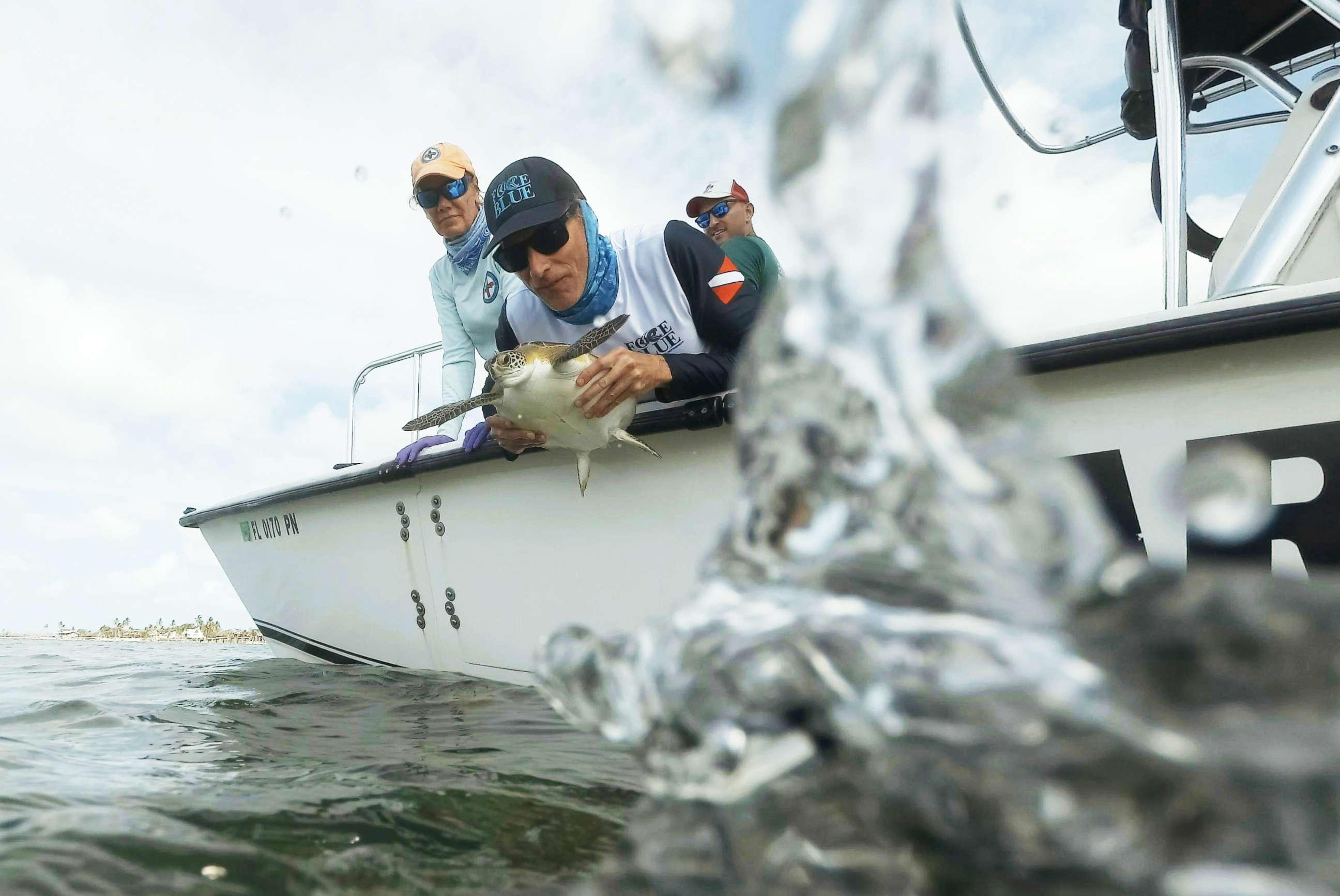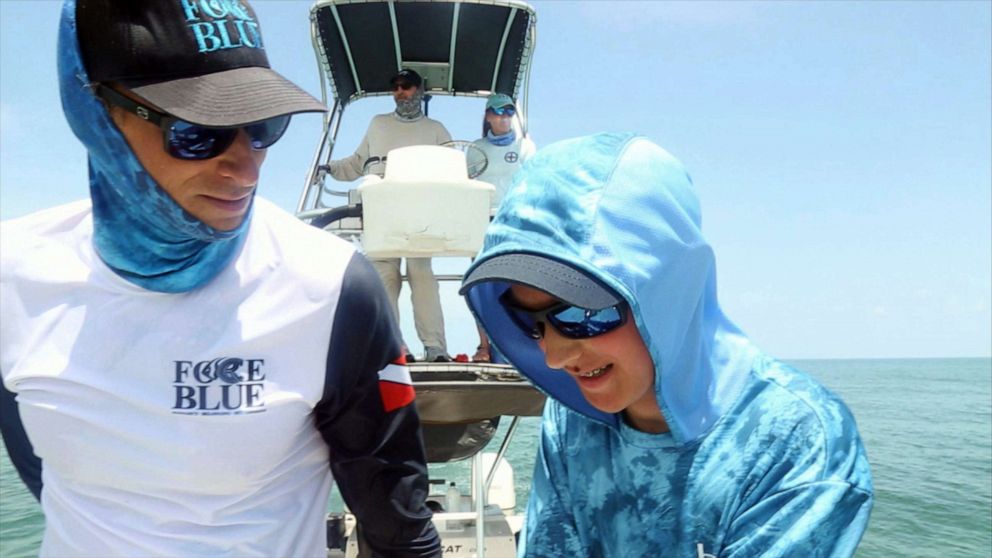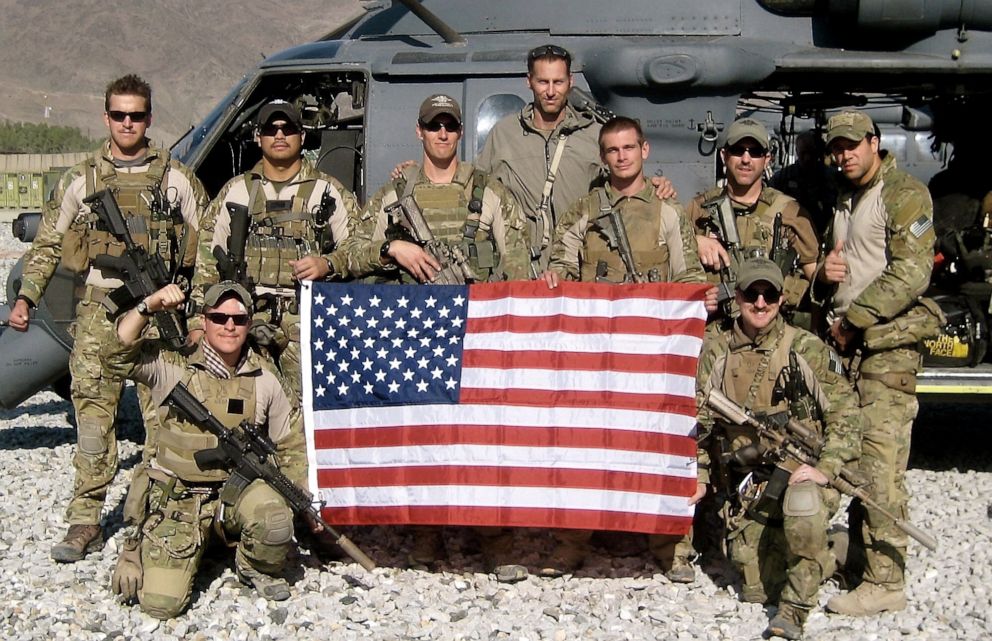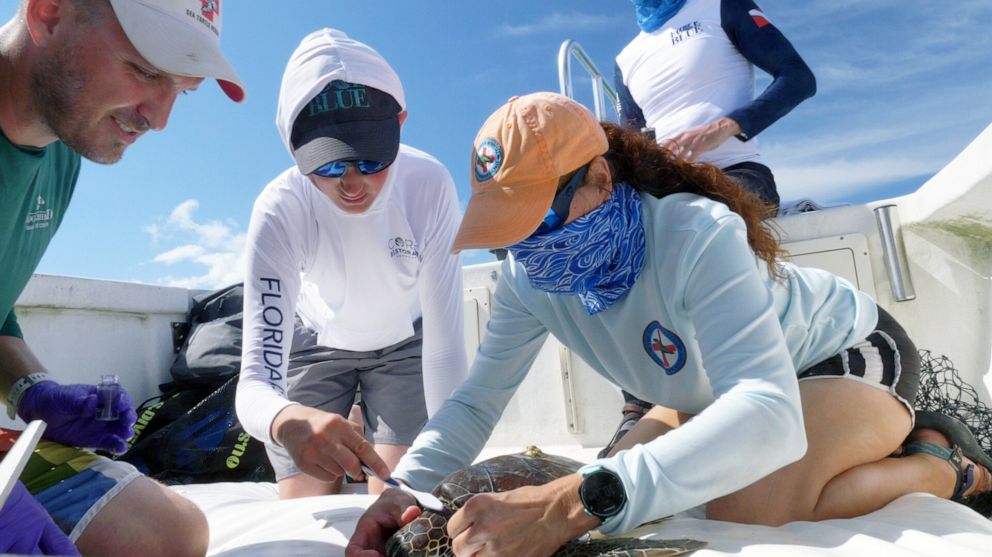Former combat Marine finds new mission for himself and son in ocean conservation
A military combat vet and his son find a new mission in ocean conservation.
U.S. Marine veteran Roger Sparks is standing at the bow of the Force Blue research vessel, his 6-foot-8-inch frame towering over the boat as it glides over the crystal-blue waters off the Florida Keys, calling out directions and poised to dive.
Sparks' 15-year-old son Oz, who is non-verbal and has cerebral palsy, looks on in rapt anticipation.
"Five feet to the right!" he shouts excitedly. "It's making its way starboard!"
Suddenly, Sparks -- the finger of his outstretched hand expertly tracking his mark -- plunges in, emerging a few moments later clutching a large, flapping green sea turtle.
The boat, filled with an unlikely mix of combat veterans, marine scientists and veterinarians, erupts in cheers.
Oz beams with delight.
Sparks is a mission leader for Force Blue, an organization that re-trains and re-deploys Special Operations military veterans with marine scientists on ocean conservation missions around the world; uniting "two seemingly disparate worlds," according to Force Blue's executive director and co-founder Jim Ritterhoff.

Force Blue
On a dive vacation to the Caribbean in 2015, Ritterhoff, an avid diver whose father was a decorated Army officer, was accompanied by Rudy Reyes, a former Recon Marine, whose dive experience had been limited to destroying military targets. Diving to explore coral reefs and learning about the threats they face transformed Reyes' understanding of the possibilities of diving. So, together, Ritterhoff, Reyes and a third friend, Keith Sahm, a fixture in the Scuba industry, established Force Blue.
Force Blue has developed its own "Scientific Diver" certification, according to Ritterhoff, and gained reciprocity with the National Oceanic and Atmospheric Administration (NOAA), which qualifies Force Blue to partner with top-class scientific centers and participate in aquatic scientific research around the globe.
For its latest mission off the Florida Keys, Force Blue partnered with The Turtle Hospital, Inwater Research Group, Loggerhead Marinelife Center and Florida Atlantic University's Harbor Branch Oceanographic Institute to study the health of green sea turtles in the Florida Keys. Some of the population is being affected by the harmful disease fibropapillomatosis, also known as FP.

'A desperate situation'
For Sparks, his journey towards the moving moment on the boat with his son and his colleagues was a long time coming.
For more than 25 years, Sparks served as a Recon Marine and an Air Force Pararescueman, also known as 'PJs.' In 2014, he earned a Silver Star Medal, the military's third-highest personal decoration for valor in combat, for his actions during a fierce battle in Afghanistan known as Operation Bulldog Bite.
In November 2010, U.S. and Afghani troops launched a counter-insurgent mission against Taliban forces in Kunar Province, Afghanistan. Sparks, acting as a Pararescueman, was tasked for eight days with rescuing and treating wounded soldiers. U.S. forces suffered a devastating onslaught from the Taliban in that battle.
Although Sparks had experienced combat before, this battle was a "surreal" experience, extremely chaotic and violent, he said.
"Every few moments I thought I was going to die," Sparks recalled. "There were panicked people, mortally wounded crawling ... soldiers dragging or holding their dead buddies. It was really a desperate situation."
Sparks dove into the chaotic battle -- packing soldiers' wounds, treating punctured lungs, creating tourniquets -- all while caught in a relentless barrage of enemy crossfire.

'Enormous grief'
Despite his efforts, multiple soldiers died in his arms.
Sparks recalled the "enormous grief" of such tragedies.
"Even though I know I didn't kill that person, when someone dies in your arms you inherit the grief … you are implicated in their death," Sparks told ABC News, reflecting on his military history.
Back at Bagram Air base, Sparks looked at pictures of his family and sobbed. He said he realized that "these life-altering experiences were making me grow away from my family."
So for the next phase of his service -- deploying on conservation missions -- Sparks sought to realign his stateside, post-combat life by reconnecting with his family -- his wife Jennifer, his son Orion, 21, and Oz.
When Oz was four months old, Sparks found him unresponsive in his crib, not breathing and without a pulse. He performed CPR on his son for 20 to 30 minutes. Oz survived, but suffered a hypoxic brain injury, leaving him with cerebral palsy and unable to speak.
Over the years, Sparks experienced a recurring nightmare in which he was a pararescueman, scrambling to save injured servicemen. But upon reaching what appeared to be an injured soldier, he would look down and see his son. These dreams linked the post-traumatic stress disorder (PTSD) Sparks suffered as a result of his military service with the anxiety he experienced in his efforts to protect his son Oz.
"The reason I think I was extremely effective at my job [as a pararescueman] ... I realized I was trying to save my son," Sparks told ABC News. "I'm his lifeline."
"Only in hindsight did I come to understand this, through the nightmares I would have."
Sparks concluded that in order to overcome the effects of these traumatic events, he had to find a way to grow alongside his son.
'Sailing home'
So when Sparks joined Force Blue he found the perfect fit -- for himself and for his son.
They've traveled together on missions from the Caribbean to the Florida Keys.
Sparks recalled how on their first mission, to the Cayman Islands, Oz "immediately wanted to jump on the boat … his desire to be there with me was overwhelming."
They jumped into the water to snorkel around some coral reefs.
"The ocean was teeming with fish," Sparks said.
Oz was gleeful.
The missions have been therapeutic for Oz, helping him cope with his disability while creating a sense of identity, Sparks said.
Oz has connected with this disparate community of military vets like his Dad, and the environmental team that have joined together to save our endangered animals and the environment.

In the end, Sparks said, Force Blue has been his salvation. Since he transitioned out of the military about a year ago, the program has "become the way forward, for myself and my family."
"In the camaraderie and in the process we're involved in and making new friendships, that's healing ... that's mercy, or as close as we're gonna get," he said.
Force Blue has helped him learn how to cope with his service-related PTSD, find a sense of purpose after the military, and help him reconnect with his family.
Sparks reflected that it's "important for us to heal others to heal ourselves ... We need to give our pain purpose ... That's the power of this [program] ... to serve something larger than ourselves."
Sparks compared this healing process to Homer's "Odyssey."
"At some point," he concluded, "we need to sail home to ourselves … from those experiences. Force Blue and the things that we're doing certainly feel like sailing home."




